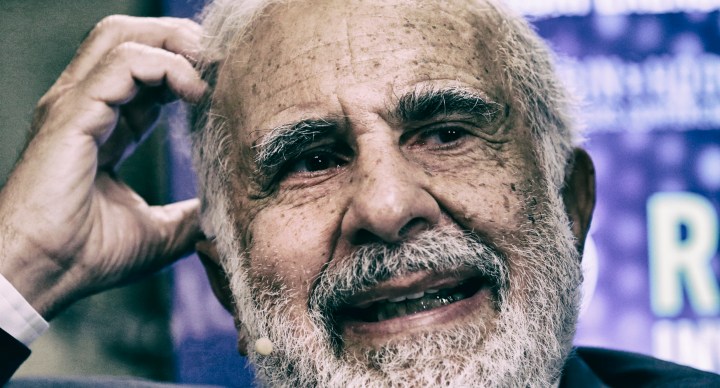BUSINESS REFLECTION
After the Bell: Icahn Enterprises — I just can’t

There is an old joke, a little stereotypical for my taste, that schadenfreude is the German word for empathy. Anyway, if you were ever in doubt about what schadenfreude actually means, we are seeing a fabulous example unfolding in international business at the moment.
A company called Hindenburg Research has just released a report on a US-based company called Icahn Enterprises which it claims is overvalued. Just another Wall Street battle, you might think? Happens every day, right? Not so much.
This story is the very epitome of schadenfreude. In the different variations of schadenfreude’s meanings, it represents them all. It’s the schadenfreude jackpot. It is the great, glittering schadenfreude in the sky.
For years, the force behind Icahn Enterprises, Carl Icahn, has bullied and pummelled a long succession of corporations into doing more or less what he wanted them to do. Icahn is now 87 years old, but has left a long trail of corporate debris behind him, and put enormous amounts of money in his own pocket. He is worth about $20-billion.
That said, he has a big reputation on Wall Street because some investors who have followed him have made a fortune. What is more, he was one of the creators of the notion of activist investing. He is also known as a corporate raider — perhaps the archetypal corporate raider — who typically launches into industrial conglomerates with a bloody axe, stripping out assets that are sold and then vacating the premises just before shareholders realise what they own is a gaping, gory, empty shell.
Gordon Gekko
The essence of the corporate raider’s mindset was fabulously expressed in the 1980s movie Wall Street, in which the character Gordon Gekko takes over a steel company (Icahn did that), an airline (Icahn did that), and a paper company. Gekko was played with fabulous conviction by Michael Douglas, and during the movie he gives one of the most enduring speeches on the notionally Darwinian logic of Wall Street about how greed will make America great again. If this sounds a bit Trumpian, that is not accidental: Icahn has been there too.
The oddity in the movie Wall Street was that Gekko, who behind the scenes was actually making his money by trading on insider information, came to be seen as a kind of a hero, or at least an antihero. He became an odd kind of advertisement for the raging Wall Street of the 1980s. People liked him, exactly the opposite of what the moviemakers intended, not least because of Douglas’s fabulous portrayal.
And likewise, Icahn is, not by chance, seen in the same light: a kind of necessary evil in the brutal process of fixing struggling companies. Stanley Weiser, who co-wrote the Wall Street screenplay with Oliver Stone, did say Gekko was partially based on Icahn, but also on disgraced stock trader Ivan Boesky and on investor Michael Ovitz.
Anyway, back to the present reality. Hindenburg Research, presumably named not very subtly after the airship that went down in flames, is a short-seller, and has put out a series of reports suggesting companies are overvalued, most recently on the Indian Adani Group, which more or less promptly imploded. Hindenburg Research now has some serious chops in the market.
And once again, it has found a gem. The problem with Icahn Enterprises is that it is 85% owned by its founder and it pays huge dividends. What’s the problem with that, you may ask? The problem is that Icahn himself doesn’t take dividends; he takes his dividends in stock, but investors get cash.
This is a neat trick. Since Icahn owns so much of the company, it means the company doesn’t have to actually pay out huge lumps of cash. But the high dividend yield (currently, about 15.8%) means there is always a line of investors around the block wanting to get in. So, the company just issues more shares to cover the cash it pays out in dividends.
What’s the problem here? Well, the problem is that eventually the true value of the company and the underlying assets start parting ways, because the more stock that is issued, the more existing shares are diluted. Hindenburg points out that as a result of this gradual dilution over the years, Icahn Enterprises’ annual dividend rate equates to an absurd 50.5% of its last reported indicative net asset value.
Is this illegal? Well, that is another interesting question. As Bloomberg columnist Matt Levine points out, when a company is overvalued, any good corporate financier will tell you that what you should do is sell shares. That is exactly what Icahn has been doing. Just as a company buys its own shares if it believes it is undervalued, it makes financial sense to convert shares to cash in the opposite scenario.
Hindenburg calls the scheme “Ponzi-like”, but the problem is that Icahn is carrying the biggest slice of the risk. As the majority owner, when the music stops he is the one who will be holding the bag with no chair behind him. In Levine’s view, Icahn is effectively getting an increasing share of a decreasing bag of cash, but up till now, his share has been increasing faster than the bag has been shrinking. That may change: the company has lost about 30% of its value since the report came out earlier this week.
Anyway, the point is that the great value creator has been exposed as having feet of clay, and hundreds of managers and owners who have been bullied, rightly or wrongly, by Icahn over the years can now savour their moment of schadenfreude. Karma is, as they say, a bitch. DM/BM
















 Become an Insider
Become an Insider
Comments - Please login in order to comment.